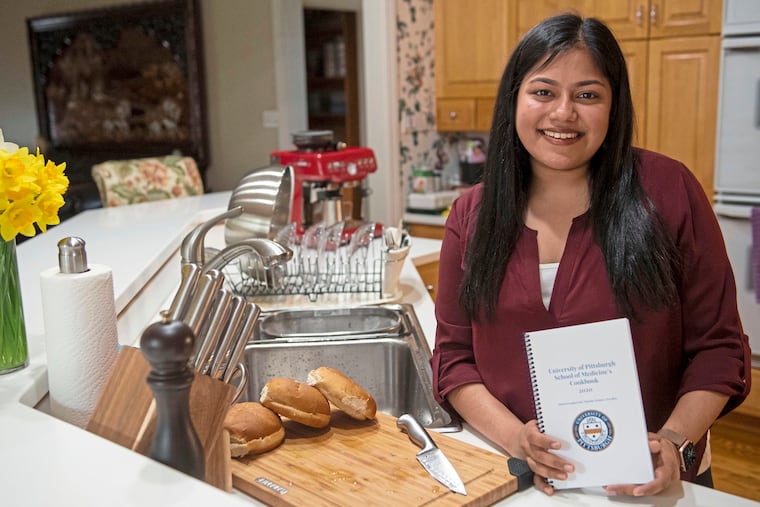This medical-school cookbook is just what the future doctors ordered
The pandemic had left students feeling disconnected, so Roy reached out to classmates to ask: Would they ask everyone they knew for their favorite recipes and compile them in a book over the summer?

PITTSBURGH — Eva Roy was destined for a career in medicine. Her father, Bhola Roy, is a fourth-generation doctor, and it was only natural that she would follow in his footsteps.
She also knew that becoming a doctor is hard work. At the University of Pittsburgh School of Medicine, students are hit with a tremendous amount of information and are expected to learn it in short order.
"It's just all very quick," says Roy, 25, who is in her third year of med school.
What the Upper St. Clair native didn’t anticipate was that there would be so little instruction on diet and nutrition. While medical students learn plenty about anatomy, biochemistry, and pharmacology, there is little discussion of “food as medicine.” The knowledge gap on the connection between nutrition education and patient health is so significant that the Harvard Law School Food Law and Policy Clinic recently did a study on it.
"It's just sad," says Roy, who grew up in the kitchen with her father and still cooks with him on weekends.
So when she heard about a “mini elective” on culinary medicine being offered to first- and second-year medical students, she signed up. She learned so much during that fun January 2020 session that she started a “Potluck Pals” cooking club with four fellow students. That lead to creation of the school’s first-ever cookbook. Published last fall, it features more than 70 favorite recipes culled from classmates, faculty, and staff at the school.
As Roy explains, pandemic-related social distancing and self-quarantining prevented students from meeting in person — disrupting classroom learning and making first-year students’ introduction to medical school even more stressful. The cookbook, which was distributed to every freshman, aims to soften the blow.
“Dear Class of 2024,” reads its introduction, “As you flip through the recipes, I hope you feel the joy and warmth that these recipes bring to each of us. We share these recipes with you, so they can help you make your medical school experience a little more enjoyable.”
The culinary medicine course was associate professor Joan Harvey’s baby. Dean of student affairs at the time, she’d long had an interest in exercise, nutrition and mindfulness. After doing a survey on it, she brainstormed with students about how to present the course. As luck would have it, someone knew someone at Phipps Conservatory and Botanical Gardens, which in 2018 opened its Botany Hall Kitchen for public cooking demonstrations. The two sides met, and a course was soon in the works.
Each of the three sessions would pair lectures on a certain aspect of nutrition or diet with hands-on, practical experience on how to plan, prepare, and share healthful recipes.
Culinary instructors for the first session in May 2019 included Andrew Red Jacobson, executive chef at The Porch in Oakland; registered dietitian Lori Bednarz; and Rosemarie Perla of Slow Food Pittsburgh. Pediatrician Keith Somers spoke to the 16 students about medical aspects. To keep it light, each class started with snacks and ended with a shared meal they'd just cooked.
In choosing which recipes and kitchen skills to highlight, kitchen manager Tess Monks focused on the typical medical student’s lifestyle. Most are very busy, often strapped for cash, and don’t have a lot of cooking skills. Instructors also had to consider what food items would be easily accessible on campus.
“It was a lot of cooking 101,” she says, along with instruction on cutting and cleaning techniques, tips on seasoning, and advice on portion control.
Students walked away with a better understanding of the interplay between nutrition and health — and they had fun. So much so, that when Roy took the elective in January 2020 with Phipps culinary instructors Amy Reed and Chris Cox, she decided to organize a culinary interest group. That way, students who couldn't snag one of the coveted spots could still pick up some pointers.
When the coronavirus hit campus in March 2020, a third planned mini elective was canceled. So students went virtual with a “lunch talk” lecture series via Zoom, touching on topics like the importance of nutrition on gut health.
The pandemic had left students feeling disconnected, so Roy reached out to classmates Maria Evankovich and Maxine Fenner, who were also part of the culinary interest group. Would they ask everyone they knew for their favorite recipes and compile them in a book over the summer?
“We basically sent an email to everyone in the medical school,” recalls Fenner, a second-year med student from Long Island, New York.
They were blown away by the response. Everyone from Jack Schumann, director of medical anatomy, to Joseph Lossee, associate dean for faculty affairs, replied, along with dozens of classmates.
Many of the recipes are globally inspired, a reflection of the school's diversity. Many dishes are healthy — Roy submitted a turkey burger recipe while Fenner offered up one for chicken fatijas — while others are decidedly not. But that's OK, says Evankovich, "because sometimes you need something healthy for the soul," like Dr. James Johnston's family recipe for marble brownies.
Seeing the passed-on recipes all together made everyone proud, says Evankovich, a second-year student from Franklin Park.
“We wanted to welcome the first-years, and pass along things that have helped us through our journey,” she says. “Some of these recipes have gotten us through a long night of studying!”
“Food and cooking is so important, and as med students we forget that,” says Roy. “But it’s so integral to being a good doctor.”